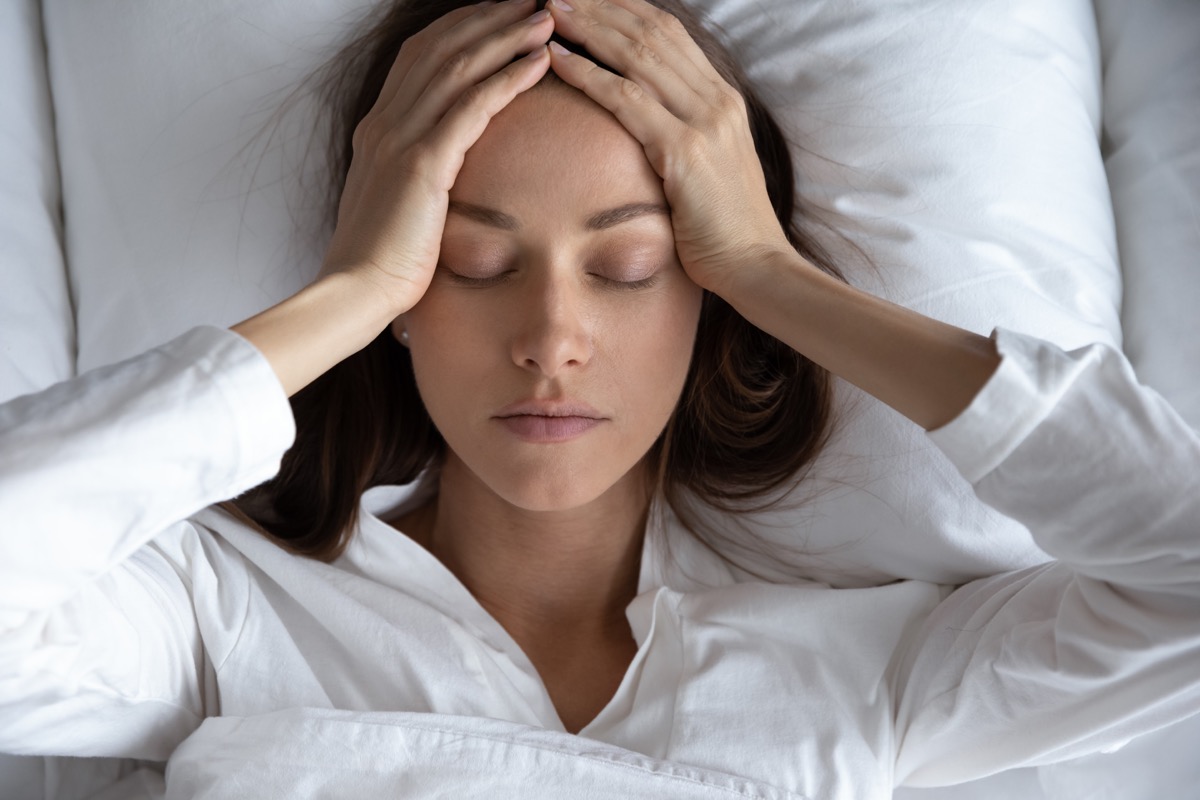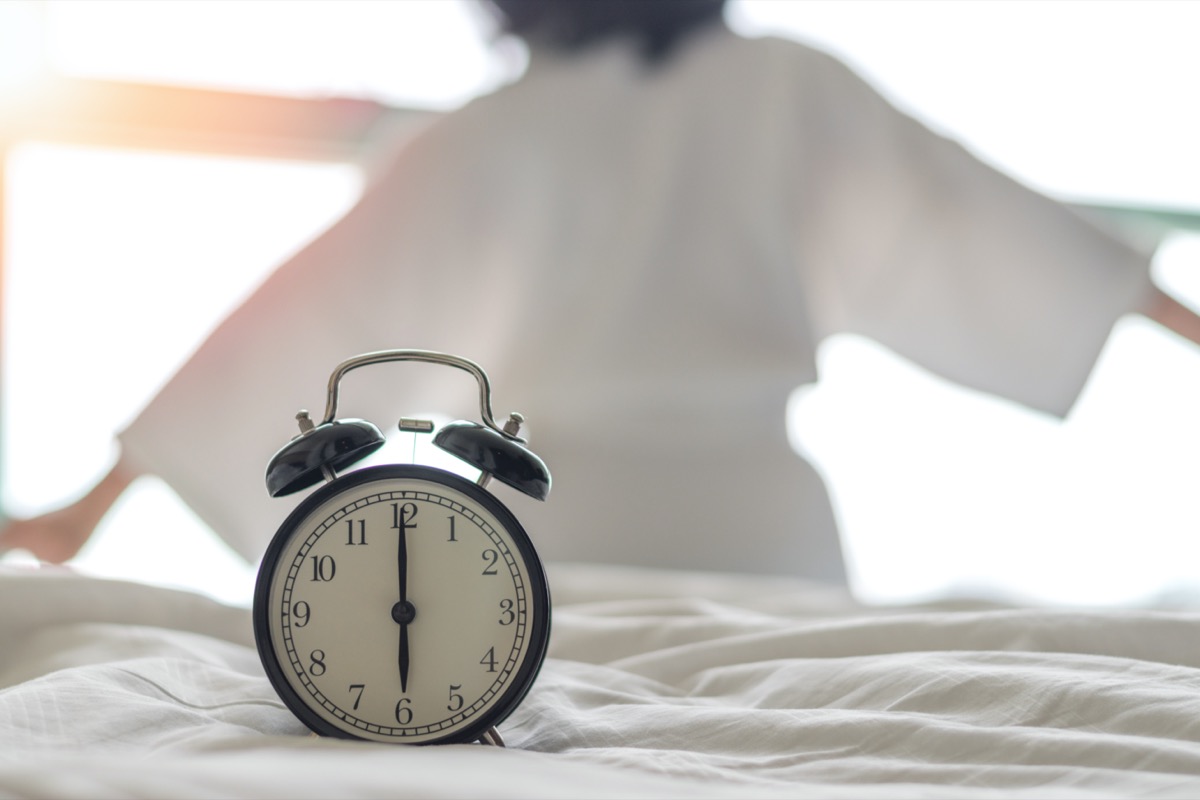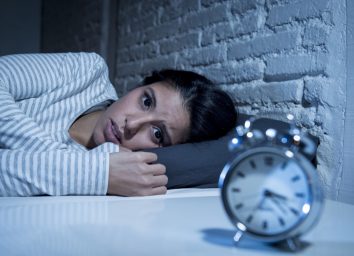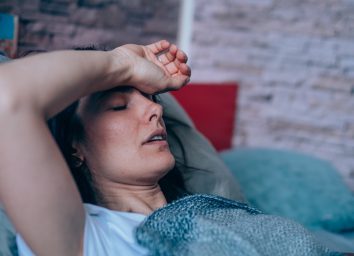The Secret Trick for Great Sleep No Matter Your Age, Say Experts

There are plenty of reasons why parents read bedtime stories to their children as they're starting to nod off in the evenings. For starters, it helps them build a larger vocabulary, fosters creativity, and helps build strong bonds between the parent and the child. But the routine also—no surprise here—helps the child drift off cozily to sleep. "Bedtime reading also provides a point of focus and distraction, away from the day's activities and frustrations, allowing the body's fatigue to take over and bring the child closer to sleep," write the experts at Read Brightly. "Even in young babies, this point of focus helps them to filter out the stimulating world around them and relax."
But plenty of leading health experts say that listening to bedtime stories can also work wonders for adults who are struggling to get more Zs. "Bedtime stories may help to stimulate our parasympathetic, decrease our anxiety, decrease our heart rate, and drop our blood pressure—all of which help us sleep," Puja Uppal, MD, a Michigan-based physician, recently told Mic.
Related: One Frightening Thing That's Killing Your Sleep, Says New Report
Mehmet Oz, MD, the cardiologist popularly known as Dr. Oz, agrees—and also spoke to Mic. "For adults, the stories can act as relief for our busy brains and shift our attention to something peaceful and serene," he said.
There is certainly no shortage of adults who could use the help. A full one-third of Americans don't get enough sleep, says the CDC, which come with serious consequences. Not getting enough sleep is linked with a poor immune system, bad concentration, weight gain, and an increased risk of disease and early death.
Given our sleep deprivation, bedtime-story podcasts are surging in popularity. One podcast, called Sleep With Me, which was launched back in 2013 by the dulcet-toned Drew Ackerman, attracts roughly 3 million listeners-per-month. In his podcast, Ackerman doesn't speak in soothing tones over the sounds of trickling water. Rather, he just tries to be as boring as possible, and spouts non-sensical stories—or will rehash old episodes of Star Trek—with plenty of meandering asides that purposefully have no point whatsoever. The idea is for the listener to be only partly engaged and only the slightest bit invested in the story.
"[The goal is to create a show] where the listener feels it is okay not to listen to me, but they could listen to me at any moment, if they feel the need to," Ackerman recently explained to The Sydney Morning Herald. "It is a delicate balance to just maintain enough interest that you feel like you're not going to think about whatever's keeping you awake, but not be so interesting that you want to stay awake for it either."
If you're having difficulty sleeping, consider trying a great bedtime story for adults. And for more ways to help sleep better, read on, because we've listed four sleep hacks right here. And if these don't work, consider trying This Easy Trick for "Falling Asleep in 5 Minutes," which has gone viral on TikTok.
Don't Actually Try to Sleep

If you have a problem of waking up in the night, don't try too hard going back to sleep. Embrace your wakefulness until your body tells you otherwise. Paradoxical intention is a sleep strategy that has been a pillar of cognitive-behavioral treatments for insomnia and related sleep issues for decades. Put simply, the strategy works like this: Rather than trying to fall back asleep, attempt to stay awake as long as possible.
"If the focus of one's life becomes so much about doing things to get to sleep, you can actually increase sleep anxiety and paradoxically stop yourself from getting sleep," observes seasoned sleep psychologist Katherine Hall, a sleep therapist at Somnus Therapy. "Just like when you try and force a quiet mind, thoughts seem to get louder."
So try to be cool with your sleepless state. Get out of bed. Read a book. In the end, you'll find that your body gets tired much faster. For more great sleep tips, see the 5 Best Ever Foods for Better Sleep.
Go to Bed at the Same Time Every Night

"If it takes a while to fall asleep at first, don't stress or 'try' to sleep; just get up and go back to your pre-bedtime ritual until you feel drowsy," Janet Hilbert, MD, once told us.
Don't Eat Dinner Too Late

According to several studies and health experts, eating dinner too late is a big sleep no-no. When you eat, your body's insulin response kicks into gear. If you feast too closely to your bedtime, it can prompt feelings of wakefulness and throw off your body's natural rhythm.
"When we eat late at night, the muscles that digest and metabolize our food have to keep working when they should be resting," observes Kate Watts, MS, RDN, LDN, CDE, a dietitian at Cone Health Nutrition and Diabetes Management. "This can delay your ability to fall asleep and can prevent you from getting the deep, restful stage of sleep you need to feel refreshed the next day.
Eat a Better Diet

Heartburn: The struggle is real for many people. And if it's not heartburn keeping you awake, then perhaps it's the sneaky caffeine lurking in some foods or the acidity from others. Familiarize yourself with these 20 Foods That Keep You Up at Night; this list will both surprise you and motivate you to say no to all of the wrong things. For more ways to sleep better, make sure you're aware of The Best Trick for Going Back to Sleep After Waking Up at Night.








